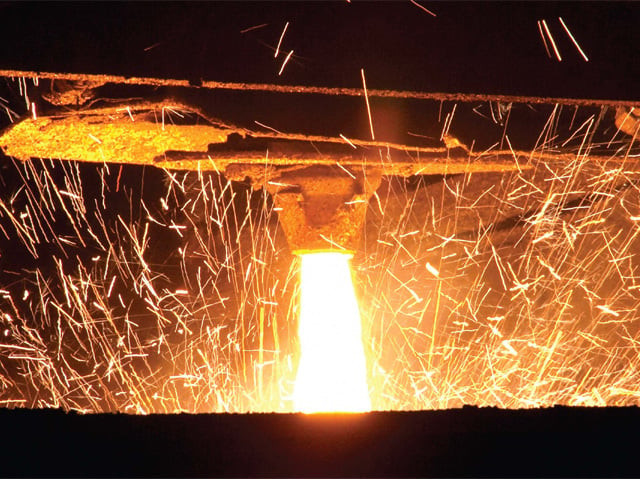Pakistan Steel Mills: Losses mount as raw material supplies dry up
Insiders blame procurement policies, low production for red ink on the company’s financial statements.

Pakistan Steel Mills: Losses mount as raw material supplies dry up
Poor supply chain management, it appears, are largely to blame for the colossal losses mounting at the state-owned Pakistan Steel Mills, the largest steel company in the country, a firm that has requested three bailouts over the last three financial to years and is unlikely to be able close the current year without substantial financial support.
A comprehensive investigation into allegations of financial malfeasance at the company, conducted by the Federal Investigation Agency, concluded that the company’s antiquated method of purchasing raw materials – primarily iron ore – was responsible for the massive increase in losses that occurred after the close of the financial year ending June 30, 2008.
The findings of the report were made available to PSM’s management in August, which was then asked to comment on it before it will be forwarded to the Supreme Court in the next few weeks, said one official at the Steel Mill.
The PSM management, however, appears to have yet to come up with solutions to the problems alluded to in the report, including the inefficiencies in its procurement and supply chain management policies.
“The biggest problem facing Pakistan Steel is a raw material shortage,” said one high-ranking official at PSM who wished to remain anonymous.
PSM had a policy of setting annual contracts for its purchases of raw materials – primarily iron ore – from its suppliers, a policy that hit the company’s finances badly as international commodity prices fluctuated wildly during 2008 and 2009. Because the steel mill had often locked in contracts for supplies at higher rates, its production costs often did not match the prices it could command for the finished product.
The company faced massive losses in fiscal year 2009 of around Rs26 billion, though those were reduced to Rs11 billion during 2010 and were projected in April to be about Rs5.6 billion during the fiscal year that ended June 30, 2011. Despite being a state-owned company, PSM does not make its financial statements available online.
PSM has since switched over to a quarterly procurement policy, which balances the company’s needs for stable prices with relative nimbleness in its ability to take advantage of fluctuations. (Iron, unlike most other metals, is not traded on commodity exchanges, thus making it difficult to hedge against price movements.)
The management of the company, however, did not elaborate on why PSM has trouble in procuring adequate supplies for its operations other than to say that they have not been able to import raw material from Iran, owing to reluctance by banks to finance the transaction due to US sanctions on Tehran.
To a large extent, however, Pakistan Steel Mills appears to be a victim of its own inability to adjust to a changing competitive environment. When it was set up in the early 1970s with the financial assistance of the Soviet Union, PSM was the only steel mill in the entire country, a monopoly it enjoyed for over two decades.
In the early 1990s, however, it began to see more competition emerge from the private sector, as the more free-market-friendly policies of then-prime minister Nawaz Sharif allowed more investment in the industrial sector.
PSM has since sunk from a virtual monopoly two decades ago to a 20% market share today, which has substantially reduced its market power in buying raw materials. It is unclear, however, whether the company’s management has adjusted to the new reality.
The company is currently producing at only 20% production capacity, well below the 70% it needs to produce at in order to remain financially viable, according to PSM insiders.
“I can assure you that we can produce at 70% capacity in a matter of days if we get the right amount of raw material,” said one source at the company.
Edited by Farooq Tirmizi
Published in The Express Tribune, October 10th, 2011.



















COMMENTS
Comments are moderated and generally will be posted if they are on-topic and not abusive.
For more information, please see our Comments FAQ